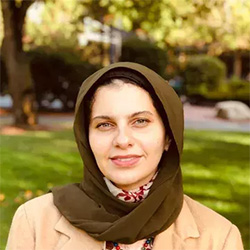
Join the Institute for the Study of Islamic Thought in Africa (ISITA) for a talk in our Spiritual Luminaries of Islamic Africa series.
Farah El-Sharif, visiting scholar at Stanford University, will discuss her research into Khadīja al-Qāriʿa bint Muhammad al-Shinqitiya (d.1948), female Saharan saint and scholar.
In 1936, Khadīja al-Qāriʿa (“the Strikeforce”) bint Muhammad al-Shinqitiya (d.1948) dictated Al-Sayf al-Yamānī fī l-dhab ʿan Sīdī Ahmad al-Tijānī ("The Yemeni Sword in Defense of the Sufi Master Aḥmad al-Tijāni") while passing through Kano, Nigeria. The manuscript was sent to the historic al-Babi al-Halabi publishing house in Cairo and printed shortly thereafter. The text has been deemed missing and out of circulation for the last few decades, only to be recently unearthed in an obscure Salafi bookshop Amman, Jordan by Dr. Farah El-Sharif, at the urging of Professor Zachary Wright and Fakhruddin Owaisi. Little is known about Khadīja al-Qāriʿa, except that she was dubbed “the master (shaykha) of the West, a righteous saint, a knower of God, drowned in the ocean of love” by Nigerian Tijanī scholars that belonged to the fayda community of Shaykh Ibrāhim Niāsse (d.1975).
A deep dive into the first and last edition of this previously missing text written by a previously ignored--but no doubt important--20th century female Saharan Muslim saint and scholar, this presentation will expound on the first full English translation of this Tijānī polemical text. Additionally, it will place "the Yemeni Sword" into its larger historical context: what was the text in response to? What can al-Qāriʿa's work tell us about post-Ottoman West African Islamic intellectual history? How does it connect with Wahhabism, Salafism, Qadirism and colonial era state-building? How does al-Qāriʿa assert herself in a time of competing claims over Islam and legitimacy?
Farah El-Sharif is a visiting scholar of Islamic intellectual history at Stanford University. She received her PhD from Harvard University in 2022, where she worked on Islam in West Africa and the intersection of Islamic law and Sufism. She received her Master’s degrees in Islamic Studies from the Graduate Theological Union in Berkeley and completed her undergraduate degree at Georgetown University’s School of Foreign Service. She served as the Associate Director of the Abbasi Program in Islamic Studies at Stanford University (2021-2023). She is currently working on her first book on the magnum opus of Hajj 'Umar Tāl (d.1864).
Audience
- Faculty/Staff
- Student
- Public
- Post Docs/Docs
- Graduate Students
Interest
- Academic (general)
- Religious/Spiritual
- Global/Multicultural
- Community Engagement